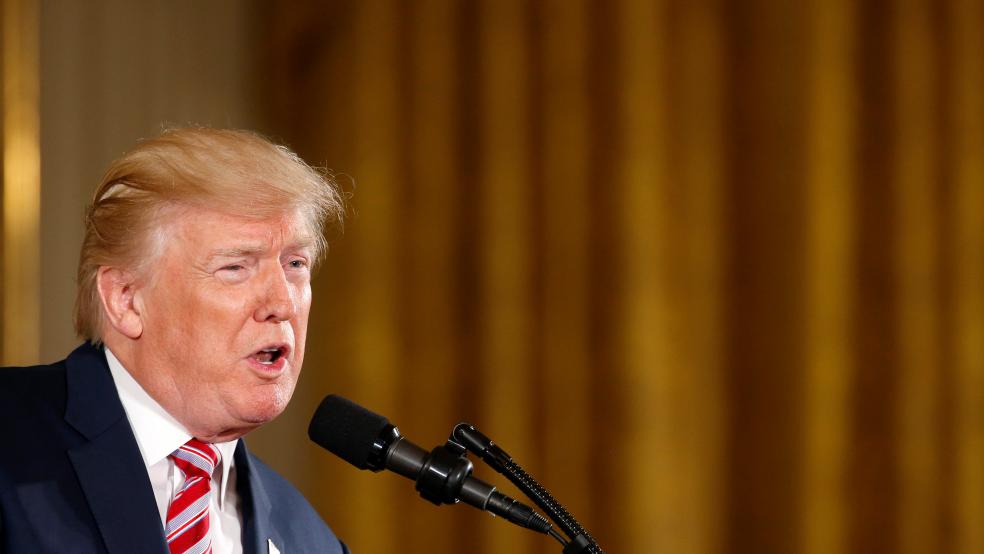Unsurprisingly, just a day after former FBI director James Comey called President Trump a liar in testimony before Congress and revealed that he had supplied the content of unclassified memos that he wrote about meetings with the president to the media, Trump’s attorney said that he would be filing a legal complaint against Comey.
The promised legal filings reportedly will be made with the Department of Justice Inspector General and the Senate Judiciary Committee as soon as early next week.
Related: The Only Person Who Can Bring Down Trump Is Sitting in the Oval Office
It's not clear how much legal weight a filing submitted to either of those entities would carry, and there are plenty of reasons to suspect that this is an empty threat anyway.
Recent history alone offers several. The president claimed repeatedly during his campaign that he would be filing lawsuits against political opponents, parties and news organizations he disliked. None were filed. The multiple women who accused Trump of sexual assault over the years were likewise promised a date in court when they came forward with their complaints. They’re still waiting.
Another indication that this is likely a bluff is who is filing it on Trump’s behalf. If this were a bona fide assertion of executive privilege, the obvious route for the president to take would be to channel the complaint through the office of the White House Counsel. But that’s not who’s promising to file this suit. Instead, it’s Trump’s personal attorney, Marc Kasowitz, who attacked Comey on Thursday for “unauthorized disclosures to the press of privileged communications with the President.”
It’s unclear exactly what the complaint will consist of. Kasowitz’s statement Thursday suggests that it might involve claims of executive privilege. Another possibility is that it might be an attempt to implicate Comey in some sort of criminal wrongdoing related to leaking government information to the press.
Related: How Trump Could (but Won’t) Escape the Comey Trap
In either case, though, Kasowitz is an odd choice. A Manhattan attorney who has, in part, made a career of defending people like Trump and former Fox News star Bill O’Reilly from sexual harassment charges, he’s not a natural choice to take the lead on a case based on Constitutional arcana and thin case law.
The more logical choice, if it’s actually a serious case, would be a veteran Washington lawyer, like Trump’s White House Counsel, Don McGahn. So far, though, his office doesn’t seem to be involved.
Despite the fact that the concept of executive privilege has been around since the advent of the presidency -- George Washington asserted it in an argument about producing documents requested by the House of Representatives -- the legal status of privilege claims is not perfectly clear.
That’s because, in the main, presidents and Congress have generally preferred to work around the courts in resolving disputes involving the ability of the executive branch to withhold information from the legislative and judicial branches of the government.
Related: Here’s the Part of Comey’s Testimony That Could Come Back to Haunt Him
Over the years, litigation has been avoided for the most part by presidents asserting privilege but then “voluntarily” handing over at least some of the material that lawmakers are looking for.
But there is a more fundamental issue with a privilege claim against Comey: Trump not only didn’t invoke executive privilege in advance of Comey’s hearing, in which the substance of his memos was discussed, he sent out a White House spokesperson early in the week to explicitly say that he would not be invoking privilege with regard to Comey’s testimony.
Those two factors are going to make it particularly hard for claims that the former FBI director violated executive privilege to stick.
As for the idea that Comey broke the law by disseminating a document that details his own recollection of a meeting with the president -- one that he consciously stripped of any classified information -- attorneys with expertise defending whistleblowers and others facing similar prosecution are all but standing in line to mock it.
Because the information was not classified -- something the White House has not challenged -- there’s virtually nothing Comey can be prosecuted for. It may be against Department of Justice policies to do what Comey did, but the harshest remedy for that is dismissal, and Trump already used that option.
Related: How the Comey Hearing Made America Great Again
For these reasons and more, the threat to take legal action against Comey looks less like a real effort to vindicate the president’s executive privilege or to punish Comey for wrongdoing than it does a piece of legal theater meant to intimidate Comey and, perhaps, to remind others who might consider providing the press access to information about Trump’s White House that the president is extremely litigious.
This is a strategy that paid off for Trump when he was a private businessman. But as he is discovering in new and increasingly painful ways, things that work in the world of New York real estate often just won’t fly in the nation’s capital.





